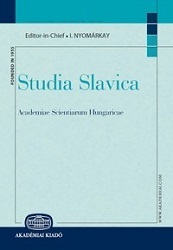Ogar(a)
Ogar(a)
Author(s): Antonín VašekSubject(s): Phonetics / Phonology, Syntax, Lexis, Semantics, Western Slavic Languages
Published by: Akadémiai Kiadó
Keywords: Carpathian Linguistic Atlas; Carpathian pastoral colonization; Moravian Wallachia; Carpathian words; ogar ‘a boy’; ohař ‘a hunting dog’;
Summary/Abstract: The present paper deals with the dialectal situation of the lexeme ogar, -a m. ‘a young man’, ‘a youth’, ‘a son’, which belongs to the core vocabulary of the traditional Eastern Moravian dialect. The dialect called Wallachian is spoken around the towns of Rožnov, Valašské Meziříčí, Vsetín, Zlín, Vizovice, and Valašské Klobouky. In the southern part of the Wallachia region (around Zlín, Vizovice, and Klobouky), the expression is realized as ogara, -y /-i m. In addition, the same sense of the word ogar is common not only in the Silesian-Moravian dialectal region (namely, the Lachia area around Frenštát), which was likewise affected by Carpathian pastoral colonization in the past, but also the eastern Moravian dialectal island of Kelč with its very specific phonology. In Slovakia, the expression is found in two places. It is attested from the Spiš region (more specifically, from Veľký Šariš), where it has a pejorative meaning and is also used as a swearword (denoting a rather neglected young man). The second location is Revúca in the Slovak Central Mountains, where it denotes a tall man who is very thin – almost emaciated. In Poland, the word ogar is attested in the southern part of the Malopolska region around Ropčice (ogar – “czasem na dziecko wołają: Ty ogarze!”) and in the Zakopane region (ogarek – “2. przezwisko małych chłopców”). This information is confirmed as of the last quarter of the nineteenth century as well as the beginning of the twentieth century by Karłowicz’s dictionary. Apart from that, the present-day Kraków urban dialect contains the expression agar ‘a youth’. The word ogar is not attested in the sense of ‘a boy’, ‘a youth’ in any other Slavonic or non-Slavonic language. As regards linguistic geography, the distribution of the word does not extend beyond the mountainous and sub-mountainous regions of the Western Carpathians. As it appears in several semantic varieties in multiple places around the Carpathian region but nowhere else, the word can be classified as a distinctly Carpathian expression. The alternate form ogarek, ogárek is a common diminutive derived by the suffix –ek and having a positive affective function. The form ogara found in southern Wallachia was most likely coined by analogy or by mistaking the indirect grammatical case of ogar for the nominative. Such a mistaken interpretation is quite plausible, given the fact that the area in question was less affected by the Carpathian pastoral colonization than the other regions. Hence the possible change of the nominative form of the word from ogar to ogara (and resulting in a different declensional pattern according to the keyword předseda). The lexeme ohař ‘a hunting dog’ is most likely to be an old borrowing from Eastern languages, which possibly indicates some degree of influence of those languages over the European area in question. As regards the Western Carpathian (and thus also the Moravian-Wallachian) ogar ‘a boy’ etc., it concerns a second borrowing of the same non-Slavonic word but with a different semantic content via Romanian (regardless of whether this non-Slavonic Eastern word got into Romanian directly or, rather, via a Slavonic language). In that sense, the word exists as yet another evidence of the Romanian linguistic (and perhaps also ethnic) involvement in the pastoral colonization of the Western Carpathians.
Journal: Studia Slavica Academiae Scientiarum Hungaricae
- Issue Year: 64/2019
- Issue No: 1
- Page Range: 185-196
- Page Count: 12
- Language: Czech
- Content File-PDF

